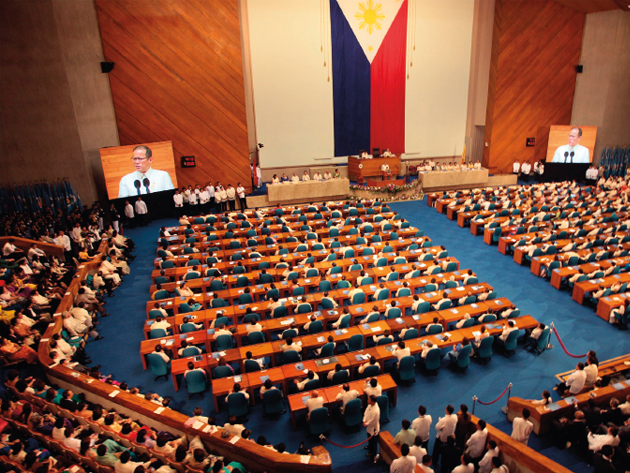Since the beginning of his term, President Benigno Aquino III has faced much scrutiny as to how his administration plans to steer the country towards the so-called tuwid na daan (straight path).
One such obstacle was the “Anti-Aquino Congress,” as the Philippine Daily Inquirer termed it in an article on May 17, 2010. In the elections that year, only 45 Liberals were elected to the House of Representatives, as opposed to 107 Lakas Kampi Christian Muslim Democrats, then-President Gloria Macapagal-Arroyo’s party. Similarly, only four members of Aquino’s ticket won senatorial seats.
In the said article, Senator Miriam Defensor-Santiago was quoted saying that “with the opposition in control in Congress, Aquino would have a hard time pushing his legislative agenda.”
Three years later and halfway through the Aquino presidency, this prediction seems to be way off the mark.
Legislative triumphs
The recently concluded 15th Congress passed a number of landmark bills, many of which were pushed by Malacañang as part of its goal to restore faith in democracy. To do this, they focused on creating and passing social reform laws.
“You cannot have democracy if you cannot solve social problems,” says Arjan Aguirre, a lecturer from the Political Science Department. He cites the Responsible Parenthood and Reproductive Health (RH) Law of 2012 and the Enhanced Basic Education Act of 2013 as two examples of these reforms.
The RH Law was signed by Aquino on December 21, 2012 despite intense opposition from various sectors, most notably the Philippine Catholic Church. The Enhanced Basic Education Act, also known as K-12, meanwhile aims to put the Philippines at par with other countries whose pre-university requirements included 13 years of education.
Two other laws signed by the president go hand-in-hand: The Sin Tax Law, which raises taxes on alcohol and tobacco products, will be used to fund the implementation of his promised Universal Health Care Law.
The latter, signed on June 19, 2013, is an amendment to the National Health Insurance Act of 1995 that allows the poor better access to quality health care services.
71 vetoes
Though it may seem that all is well between Congress and Malacañang, there have been instances where the two have not seen eye-to-eye.
Specifically, these occurred when Aquino decided to veto 71 bills during the 15th Congress, of which 60 were local bills and 11 were national.
Aguirre believes that the numerous vetoes show a “lack of coordination” between the two branches. The administration was criticized for not regularly convening the Legislative-Executive Development Advisory Council, a body tasked to iron out details of the legislative agenda.
Just last year, both branches have shown that critical collaboration could turn the two into a powerful force.
On December 12, 2011, 188 congressmen voted to endorse the impeachment complaint against then-Chief Justice Renato Corona. Though the move came as a surprise to many, Aquino had previously expressed his dislike of the Arroyo appointee. Reports later surfaced that the President had been actively strategizing with House leaders to impeach Corona.
Five months later, the Senate impeachment court voted to oust Corona, 20-3, on the grounds of not properly disclosing his assets, liabilities and net worth.
Institutional reforms
A larger number of Aquino’s political allies have been elected in the 16th Congress. Some have urged him to use this advantage in passing laws that will strengthen the foundation of the democratic institutions.
“If you want to have a better society, create first the important institutions.” Aguirre said.
One example is the Freedom of Information (FOI) bill. If passed, this bill will require government institutions to disclose all of their important documents to the public, effectively promoting transparency.
Exequiel Salcedo of The Ateneo Assembly says, “The passage of this bill will signify the beginning of a truly reformed politics in the Philippine government.”
“Ironically, however, reservations and qualms on this issue… seem to come from the Palace and its allies in Congress,” he adds.
Another bill that both Aguirre and Salcedo believe should be passed is the Party Development bill, which involves the financing of political parties by the public. With public financing comes monitoring of spending, which will require that parties become more institutionalized.
The bill will also prevent politicians from easily switching parties and becoming what Aguirre calls “political butterflies.”
“They cannot just do that whole ‘political butterfly’ thing. We will restrict this and regulate this because we do not want to further undermine the political parties we have right now,” says Aguirre.
In an e-mail interview with The GUIDON, Alma Salvador, PhD, chairperson of the Political Science Department, said she wants to see the administration focus on six issues within the next three years: Bills on employment, access to education, K-12, health, security and local peace.
Ticking clock
Unfortunately, time is not on Aquino’s side.
Aguirre believes that the present Liberal-led majority coalition in Congress will not last long. “As that president approaches the end of his term, he becomes a lame duck because, of course, the political loyalties… change,” he explains.
This volatile setup was the same reason Aquino got his way through the last Congress. After it was clear that Aquino was set to become president, many congressmen immediately switched alliances and joined the Liberals.
Three years from now, if reforms such as the Party Development bill have not yet been enacted, Aquino and the Liberals may be the ones to fall victim to this current political reality—especially since the ruling party has not yet fielded a credible opponent to Vice President Jejomar Binay.
For now, Aguirre thinks the administration is doing quite well keeping its legislative promises, but much still has to be done.
“This administration has yet to address some of the main issues… vis-à-vis the laws that should be passed,” he said in a mix of English and Filipino.
Thus, it is up to the two branches of government to use their arguably harmonious relationship to bring about lasting change.




